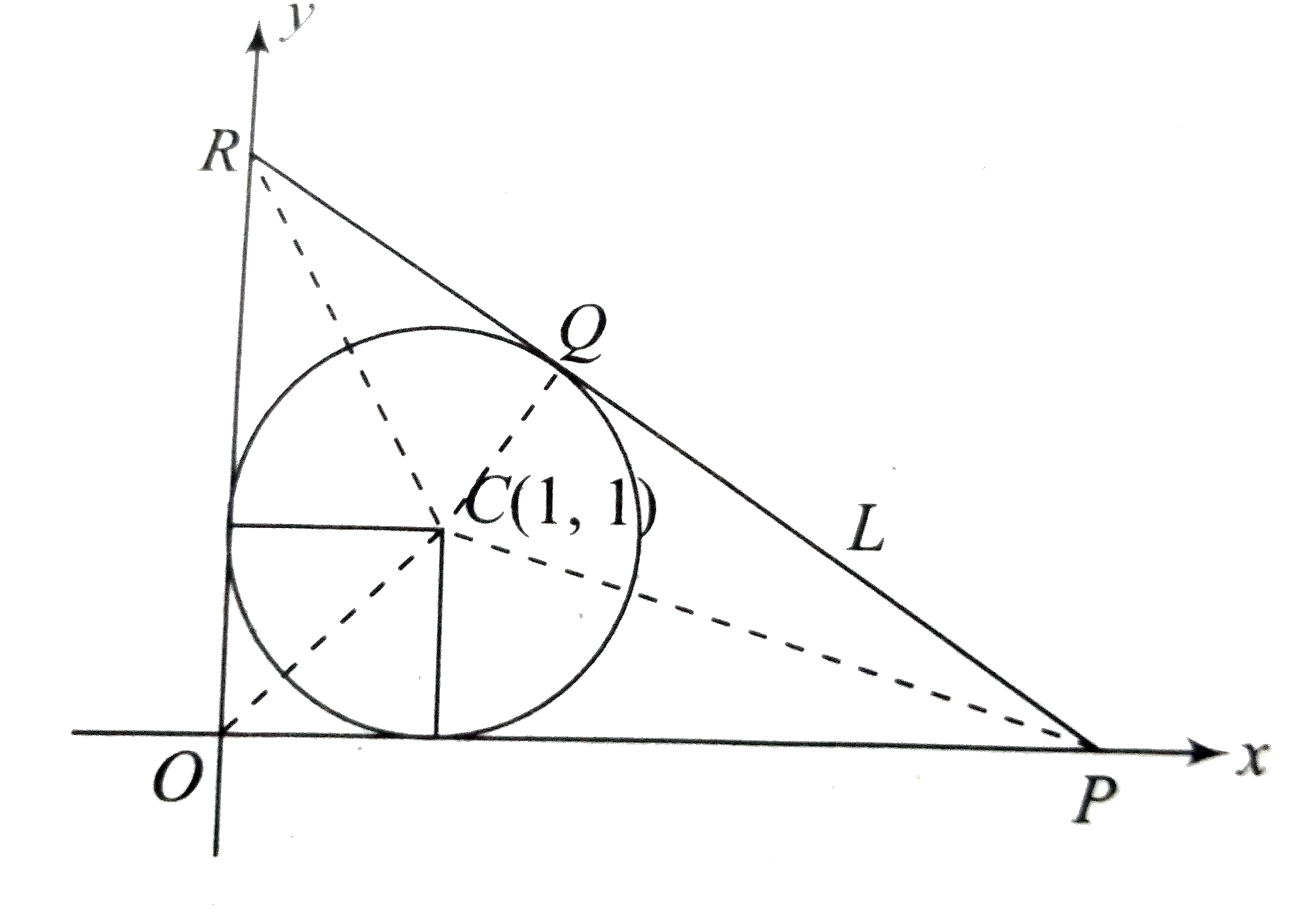Let z1,z2andz3 represent the vertices A,B,andC of the triangle ABC, respectively, in the Argand plane, such that |z1|=|z2|=5. Prove that z1sin2A+z2sin2B+z3sin2C=0.Solution in Bengali
|z1|=|z2|=|z3|=5
⇒|z|=5 is the circumcircle of triangle ABC
⇒∠AOB=2C,∠BOC=2A, and ∠COA=2B

We have,
z2z1=OBOAei2C=ei2C
Similarly, z3z1=OCOAe−i2B=e−i2B
Now, z1sin2A+z2sin2B+z3sin2C
=z1(sin2A+z2z1sin2B+z3z1sin2C)
=z1(sin2A+sin2Bei2C+sin2Ce−2iB)
=z1(sin2A+sin2Bcos2C+isin2Bsin2C+sin2Ccos2B−isin2Csin2B)
=z1(sin2A+sin(2B+2C))
=z1(sin2A+sin(2π−2A))
=0
Topper's Solved these Questions
- COMPLEX NUMBERSBOOK - CENGAGE PUBLICATIONCHAPTER - COMPLEX NUMBERSEXERCISE - SLOVED EXAMPLES
15 Videos
- COMPLEX NUMBERSBOOK - CENGAGE PUBLICATIONCHAPTER - COMPLEX NUMBERSEXERCISE - EXERCISE3.1
4 Videos
- COMPLEX NUMBERSBOOK - CENGAGE PUBLICATIONCHAPTER - COMPLEX NUMBERSEXERCISE - Comprehension
11 Videos
- CIRCLESBOOK - CENGAGE PUBLICATIONCHAPTER - CIRCLESEXERCISE - Comprehension Type
8 Videos
- CONIC SECTIONSBOOK - CENGAGE PUBLICATIONCHAPTER - CONIC SECTIONSEXERCISE - All Questions
102 Videos
Similar Questions
ifωandω2 are the nonreal cube roots of unity and [1/(a+ω)]+[1/(b+ω)]+[1/(c+ω)]=2ω2 and [1/(a+ω)2]+[1/(b+ω)2]+[1/(c+ω)2]=2ω , then find the value of [1/(a+1)]+[1/(b+1)]+[1/(c+1)].
View SolutionIs the following computation correct? If not give the correct computation: [√(−2).√(−3)]=√(−2).−3=√6
View SolutionConsider the region R in the Argand plane described by the complex number. Z satisfying the inequalities |Z−2|≤|Z−4|, |Z−3|≤|Z+3|, |Z−i|≤|Z−3i|, |Z+i|≤|Z+3i|
Answer the followin questions :
Maximum of |Z1−Z2| given that Z1, Z2 are any two complex numbers lying in the region R is
View Solution
In the diagram as shown, a circle is drawn with centre C(1,1) and radius 1 and a line L. The line L is tangent to the circle at Q. Further L meets the y-axis at R and the x-axis at P in such a way that the angle OPQ equals θ where 0<θ<π2.
Coordinate of Q is
View SolutionGiven that A(1,1) and B(2,−3) are two points and D is a point on AB produced such that AD=3AB. Find the coordinates of D.
View SolutionIF the vertices of a triange ABC are respresented by z1,z2andz3 respectively, show that its circumcentre is z1sin2A+z2sin2B+z3sin2Csin2A+sin2B+sin2C
View SolutionIf z1,z2,z3 are the points A, B, C in the Argand Plane such that 1z2−z3+1z3−z1+1z1−z2=0 , Prove that ABC is an equilateral triangle .
View SolutionLet z1,z2,z3 be three distinct complex numbers satisfying |z1−1|=|z2−1|=|z3−1|. Let A , B, and C be the points represented in the Argand plane corresponding to z1,z2andz3 respectively. Prove that z1+z2+z3=3 if and only if ΔABC is an equilateral triangle.
View SolutionConsider the circle |z|=r in the Argand plane, which is in fact the incircle of triangle ABC. If contact points opposite to the vertices A,B,C are A1(z1),B(z2)andC1(z3) , obtain the complex numbers associated with the vertices A,B,C in terms of z1,z2andz3.
View SolutionLet z1,z2andz3 represent the vertices A,B,andC of the triangle ABC, respectively, in the Argand plane, such that |z1|=|z2|=|z3|=5. Prove that z1sin2A+z2sin2B+z3sin2C=0.
View SolutionOn the Argand plane z1,z2andz3 are respectively, the vertices of an isosceles triangle ABC with AC=BC and equal angles are θ. If z4 is the incenter of the triangle, then prove that (z2−z1)(z3−z1)=(1+secθ)(z4−z1)2.
View SolutionZ1≠Z2 are two points in an Argand plane. If a|Z1|=b|Z2|, then prove that aZ1−bZ2aZ1+bZ2 is purely imaginary.
View SolutionZ1≠Z2 are two points in an Argand plane. If a|Z1|=b|Z2|, then prove that aZ1−bZ2aZ1+bZ2 is purely imaginary.
View SolutionIf z1,z2,z3 are three nonzero complex numbers such that z3=(1−λ)z1+λz2whereλ∈R−{0}, then prove that points corresponding to z1,z2andz3 are collinear .
View SolutionIf in argand plane the vertices A,B,C of an isoceles triangle are represented by the complex nos z1,z2,z3 respectively where ∠C=90∘ then show that (z1−z2)2=2(z1−z3)(z3−z2)
View SolutionIfz1,z2,z3 represent three vertices of an equilateral triangle in argand plane then show that 1z1−z2+1z2−z3+1z3−z1=0
View Solution
